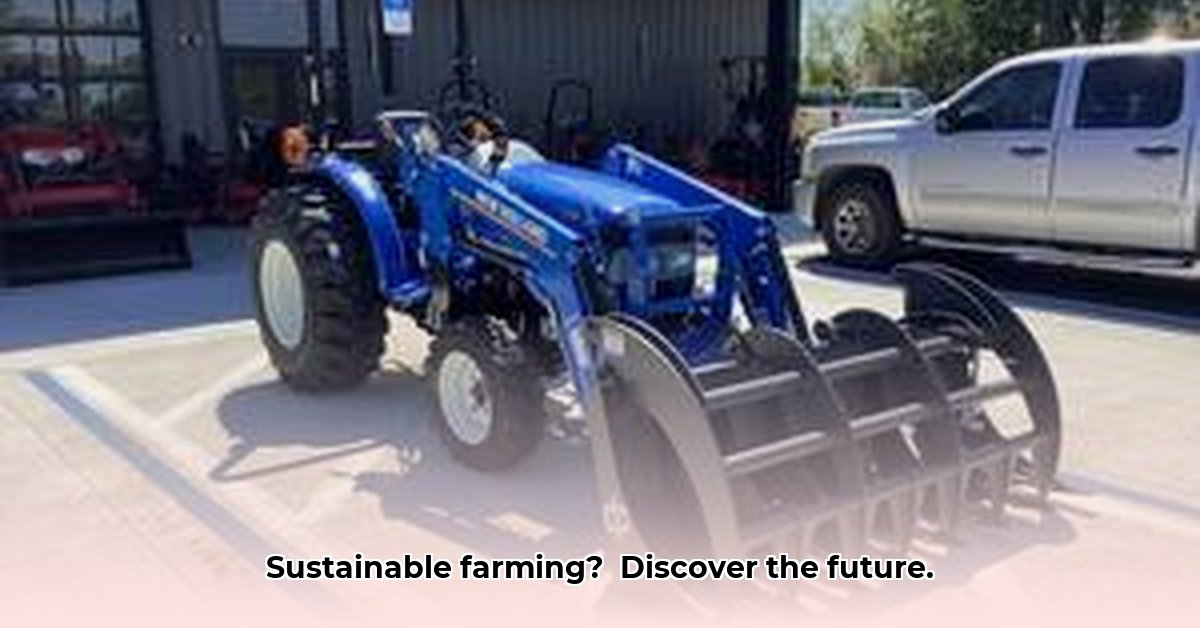
Ocala Tractor LLC, a prominent agricultural equipment supplier in Ocala, Florida, is playing a key role in the transition to sustainable farming practices. Their partnership with New Holland provides access to cutting-edge machinery, but the true impact of their efforts requires a deeper examination. This case study explores Ocala Tractor LLC's contribution to sustainable agriculture, including the potential environmental benefits of their equipment and actionable steps for future growth. For more information on New Holland's commitment to sustainability, check out their website.
Ocala Tractor LLC: A Legacy of Service and Innovation
For years, Ocala Tractor LLC has served the agricultural community of Ocala, building a strong reputation for reliable equipment and expert service. Their commitment extends beyond simple sales; they provide comprehensive maintenance, repairs, and operator training, fostering long-term relationships with their clients. This personalized approach is instrumental in building trust and facilitating the adoption of new, sustainable technologies. Their deep understanding of local farming challenges allows them to offer tailored solutions that directly address the needs of their clientele.
New Holland Equipment: Precision and Efficiency for Sustainable Outcomes
Ocala Tractor LLC's partnership with New Holland grants access to a wide array of agricultural machinery. New Holland is increasingly known for its commitment to sustainable practices, incorporating fuel-efficient designs and precision agriculture technologies into its equipment. While specific model details require further research, we can expect that the tractors and harvesters offered by Ocala Tractor LLC likely include features such as advanced fuel injection systems, resulting in lower fuel consumption and reduced greenhouse gas emissions. The incorporation of GPS-guided systems and variable-rate application technologies further contributes to sustainable outcomes by minimizing resource waste and optimizing input utilization.
Assessing Sustainability: A Holistic Approach
Evaluating the environmental impact of agricultural equipment is multifaceted. A comprehensive lifecycle assessment, encompassing manufacturing, transportation, operation, and disposal, is essential. While specific data for Ocala Tractor LLC's equipment is currently unavailable, we can highlight some potential benefits. For instance, fuel-efficient equipment directly translates to reduced carbon emissions. Precision agriculture technologies minimize the need for excessive fertilizer and pesticide application, leading to reduced environmental runoff and improved soil health. However, limitations exist. The manufacturing process itself and end-of-life management of the equipment present further challenges demanding detailed investigation. Ongoing research is crucial for a complete sustainability assessment. Isn't the lack of readily available comprehensive data on agricultural equipment's sustainability a significant hurdle in promoting truly informed choices?
Stakeholder Engagement: Collaboration for a Shared Goal
Sustainable agriculture necessitates collaboration among various stakeholders. Ocala Tractor LLC plays a crucial role in providing access to equipment and expertise, but this is only one piece of the puzzle. Local farmers directly implement sustainable practices, guided by the equipment and knowledge provided. Government agencies can incentivize sustainable practices and develop supportive regulations. Consumers, through their purchasing choices, also play a vital part, driving demand for sustainably produced goods. A collaborative approach between these groups is indispensable for long-term success.
Actionable Recommendations for Enhanced Sustainability
Several steps can significantly enhance the sustainability of agricultural practices in the Ocala region:
Comprehensive Equipment Data Collection: Ocala Tractor LLC should conduct a meticulous inventory of their equipment, carefully evaluating fuel efficiency, emissions, and overall lifespan for each machine. This granular data is essential for informed decision-making regarding future equipment acquisitions.
Transparent Sustainability Reporting: Publishing transparent and easily accessible sustainability reports detailing their efforts and progress is paramount. These reports should include details on lifecycle assessments, waste reduction strategies within their operations, and educational initiatives aimed at promoting sustainable practices among their clientele. Transparency fosters accountability and trust within the community.
Farmer Education and Empowerment: Ocala Tractor LLC should actively invest in workshops and training sessions demonstrating the benefits of fuel-efficient equipment and sustainable farming techniques. Hands-on demonstrations will empower farmers to adopt environmentally responsible approaches, creating a culture of sustainability within the wider agricultural community. Such initiatives could include demonstrations of precision farming techniques and cost-benefit analyses showcasing the long-term advantages of sustainable practices.
Strategic Partnerships: Collaborations with local, state, and federal agencies and research institutions are essential. These partnerships can provide access to funding opportunities, valuable research data, and best practices, amplifying the effectiveness of sustainability initiatives.
Conclusion: A Path Towards Sustainable Growth
The transition towards sustainable agriculture is an ongoing process. Ocala Tractor LLC can mitigate potential risks, such as equipment malfunction, regulatory changes, and market fluctuations, through proactive measures including robust maintenance programs, strong supplier relationships, and a diversified business model. A commitment to continuous improvement, driven by data-driven decision-making and open communication, is essential for long-term success. The collective commitment of Ocala Tractor LLC and other key stakeholders is vital for securing a future of sustainable agriculture in the Ocala region. The future necessitates a collective commitment to innovation and environmental responsibility. The path forward requires a collaborative spirit and a shared vision for a greener future.
How to Choose Sustainable Farm Equipment in Florida
Key Takeaways:
- Ocala Tractor LLC offers a broad selection of agricultural equipment, providing farmers with options to suit diverse needs and budgets. These include both established and innovative technologies.
- Sustainable equipment selection extends beyond initial cost. Long-term operating costs, maintenance requirements, parts availability, and fuel efficiency are crucial factors.
- Farmers must carefully assess their individual needs and technological capabilities. Cutting-edge technologies might not always be necessary or financially viable.
- The environmental impact of farm equipment is multifaceted, requiring meticulous lifecycle analyses for accurate evaluations.